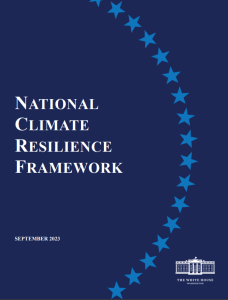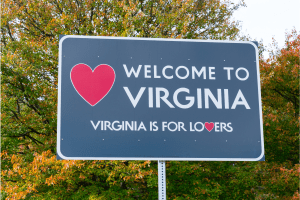Written by Ann Randolph Whitlow
 In a time when climate change is making its presence felt with unprecedented intensity, President Biden has taken a groundbreaking step in the nation’s response by directing the creation of the National Climate Resilience Framework. This initiative aims to expand and accelerate climate resilience efforts at both national and local levels, recognizing the increasing challenges posed by climate change, which have led to extreme weather events impacting millions of Americans. But what does this framework mean for Virginia, and how can it help build resilience in the state?
In a time when climate change is making its presence felt with unprecedented intensity, President Biden has taken a groundbreaking step in the nation’s response by directing the creation of the National Climate Resilience Framework. This initiative aims to expand and accelerate climate resilience efforts at both national and local levels, recognizing the increasing challenges posed by climate change, which have led to extreme weather events impacting millions of Americans. But what does this framework mean for Virginia, and how can it help build resilience in the state?
The Urgent Need for Climate Resilience
The National Climate Resilience Framework underscores the urgent need for comprehensive and community-driven climate resilience strategies. Virginia, like many other states, has witnessed the destructive force of climate change, including rising sea levels, increased flooding, and more frequent extreme weather events. These challenges require a proactive and tailored approach to safeguarding the state’s communities and environment.
Local Solutions at the Core
 The framework acknowledges the proactive efforts of communities across the United States, including Virginia, in adopting locally tailored solutions. These solutions include restoring natural infrastructure, embracing clean energy technologies, and incorporating Indigenous Knowledge to enhance resilience. For Virginia, these local initiatives are pivotal in strengthening the state’s response to climate change and mitigating its impacts.
The framework acknowledges the proactive efforts of communities across the United States, including Virginia, in adopting locally tailored solutions. These solutions include restoring natural infrastructure, embracing clean energy technologies, and incorporating Indigenous Knowledge to enhance resilience. For Virginia, these local initiatives are pivotal in strengthening the state’s response to climate change and mitigating its impacts.
Federal Support and Funding
The Biden-Harris Administration has taken historic measures to support climate resilience efforts. Federal agencies have been directed to tighten flood risk standards, upgrade building codes, and promote nature-based solutions. Notably, the Administration’s Investing in America agenda, with legislations like the Bipartisan Infrastructure Law and the Inflation Reduction Act, allocates over $50 billion to advance climate resilience strategies nationwide. This funding can significantly benefit Virginia by enabling the implementation of climate resilience measures and infrastructure upgrades.
Environmental and Economic Justice
 Recognizing that low-income communities, communities of color, and Tribal Nations are disproportionately affected by climate change, the Administration has prioritized environmental and economic justice in its climate resilience agenda. This commitment, as seen in Executive Order 14096 and the Justice40 Initiative, aims to ensure that disadvantaged communities in Virginia and across the nation receive stronger protection from climate-related impacts.
Recognizing that low-income communities, communities of color, and Tribal Nations are disproportionately affected by climate change, the Administration has prioritized environmental and economic justice in its climate resilience agenda. This commitment, as seen in Executive Order 14096 and the Justice40 Initiative, aims to ensure that disadvantaged communities in Virginia and across the nation receive stronger protection from climate-related impacts.
Six Core Objectives
The National Climate Resilience Framework, released on September 28, 2023, outlines six core objectives to strengthen the nation’s climate resilience:
- Embed climate resilience into planning and management.
- Increase resilience of the built environment to both acute climate shocks and chronic stressors.
- Mobilize capital, investment, and innovation to advance climate resilience at scale.
- Equip communities with the information and resources needed to assess their climate risks and develop tailored solutions.
- Sustainably manage lands and waters to enhance resilience while providing numerous other benefits.
- Help communities become not only more resilient but also more safe, healthy, equitable, and economically strong.
Local Leadership in Resilience
The framework highlights local leadership in implementing resilience measures, such as overhauling zoning ordinances to integrate resilience. In Norfolk, VA a new zoning ordinance requires all new development to meet a resilience quotient based on risk reduction, stormwater management, and energy resilience. This example demonstrates the vital role that local governments play in strengthening climate resilience.
 Federal Initiatives Impacting the Building Environment
Federal Initiatives Impacting the Building Environment
For contractors operating within the built environment, the framework introduces various initiatives. The Department of Treasury’s energy-efficient home tax credit offers up to $5,000 for eligible contractors in Virginia working on updating homes to meet energy efficiency standards. Additionally, the Department of Energy has awarded funding to update the electric grid, supporting climate and electrification initiatives. FEMA and other federal agencies have also released guidance for implementing consensus-based building codes and standards to achieve climate resilience.
 The Path Ahead
The Path Ahead
The National Climate Resilience Framework is a significant step toward building a climate-resilient nation, with a focus on the well-being and equity of all communities. It highlights the importance of proactive, whole-system, equitable, people-centered, collaborative, and durable solutions. While the framework sets the stage, the next step for Virginia and the nation may be to establish clear timelines, milestones, and metrics for success. This will ensure that the framework is not just a vision but a tangible plan for building climate resilience.
The release of this framework signals a new focus on climate adaptation and resilience, and it’s an opportunity for Virginia to take proactive steps toward a more resilient and sustainable future. By embracing the principles and objectives outlined in the National Climate Resilience Framework, Virginia can lead the way in climate resilience efforts and set an example for the rest of the nation.
 Ann Randolph Whitlow is a graduate student at Virginia Tech’s Center for Leadership in Global Sustainability. She will graduate with a Master of Natural Resources in Global Sustainability in December 2023.
Ann Randolph Whitlow is a graduate student at Virginia Tech’s Center for Leadership in Global Sustainability. She will graduate with a Master of Natural Resources in Global Sustainability in December 2023.







